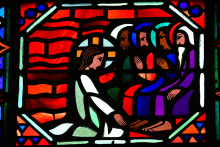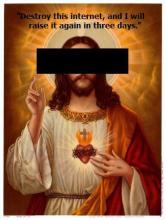wisdom

WHEN EMILY DICKINSON first read the novel Jane Eyre, she didn’t know the name of its author. At the time, Charlotte Brontë wrote under the pseudonym Currer Bell, and her work was the subject of controversy. The British Quarterly Review referred to Bell as “a person who ... combines a total ignorance of the habits of society, a great coarseness of taste, and a heathenish doctrine of religion” and said, “the tone of mind and thought which has overthrown authority and violated every code human and divine ... is the same which has also written Jane Eyre.”
When Dickinson returned Jane Eyre to the friend who lent it to her, she sent it with a bouquet of box leaves and a note that makes it clear she’d heard the gossip on Bell. She wrote, “If all these leaves were altars, and on every one a prayer that Currer Bell might be saved — and you were God — would you answer it?” Years later, when Brontë died, Dickinson wrote the following elegy: “Oh, what an afternoon for heaven, / When ‘Brontë’ entered there!”
As Dickinson’s biographer Alfred Habegger notes, this elegy not only grants Brontë salvation but also “made heaven the beneficiary.” Even in these brief notes on Brontë, we can see some of the common themes of Dickinson’s poetry. There is the impulse to engage with (and even affirm) the ideas of God and heaven but also the impulse to subvert rigid and exclusive notions of theology.

WITH THIS MONTH'S liturgical arc, we move from Epiphany to Lent: from a season of illumination to one of penitence. You’d think they would be reversed, though. You’d think it would be necessary to do the soul-searching first, to clean house before we get to invite God over for tea.
But the natural order of things always becomes topsy-turvy when God gets involved. God’s time “doubles back and loops around and ends up looking something like ... the name ‘Jeremy Bearimy’ in cursive English,” as Michael (Ted Danson) explains to Eleanor (Kristen Bell) in television’s The Good Place. The dot over Bearimy’s “i” represents Tuesdays, July, and “when nothing never occurs.”
Joking aside, this is the gift of the liturgical calendar: It lets us glimpse what it’s like to live in God’s time rather than our own. We don’t need to be worthy of an encounter with God before that encounter can happen because we constantly live in the kingdom space of already-not-yet. Revelation and repentance are like the proverbial chicken and egg: No one really knows which comes first, and it probably doesn’t matter in the end.
Divine time’s topsy-turvy nature is also why Christians are called to discern the difference between the “wisdom of this age” and God’s wisdom (1 Corinthians 2:6-7). What this month’s readings might call us to ponder, then, is not where human and Divine wisdoms diverge but, rather, where on Jeremy Bearimy’s curves they converge. Perhaps even on the dot of the “i.”

WE LONG FOR new beginnings, a restart, to go back in time to correct our mistakes or dodge the harm someone has done to us. But those former lives are inaccessible to us. All we have is this life now. Here we are in the middle: after the beginning and before the end. Usually we associate “middles” with “stuckness”—not the excitement of the new and not the relief of an end but locked in between. For example, the morass that prompts a midlife crisis, that languorous experience of the middle of life that leads to the purchase of a motorcycle.
In the church calendar, we’re in the season called “ordinary time,” a long stretch of weeks between Pentecost and Advent. These are the middle months where the scriptures plop us into the middle of stories. And that is where we find Jesus. The incarnation is an act of God in the middle of Israel’s story: not the beginning, not the conclusion, but God-with-us in the middle. This season of unceasing tedium has also been taken up into the life of God. Perhaps we could describe the incarnation as the midlife crisis of God?
Jesus is the one who has been with us from before the beginning, who has witnessed the groaning of all creation, the births and deaths and the life in between—and comes to us now, where we are, in our midlife, with our regrets and unfulfilled dreams, and guides us as we wander into the ordinary goodness of life.

I WAS CALLED “John the Baptist” because of that great revival movement we had down by the Jordan River. We were all so hopeful then, especially after my cousin Jesus showed up. I suspected he was The One to save our people, even after he asked me to baptize him. But when I heard that heavenly voice announcing, “This is my Son,” I knew. Judgment was coming! Jesus would know how to separate the wheat from the chaff and burn the chaff with unquenchable fire (Matthew 3:11-17)!
I was on a roll. We Jews would live by Yahweh’s law, Rome’s yoke would be cast off, and everything would change. I kept preaching and baptizing, and I even chastised Herod Antipas for his unlawful marriage (Mark 6:17-18), confident he was part of the “chaff.” Jesus was our Messiah, the Anointed One of Israel—and I had been his forerunner (Matthew 3:2-3). Yet here I am—chained to a wall in Herod’s dreary prison cell. What went wrong?
I assumed Jesus would gather and train disciples to prepare for a revolution. But rumors from my own disciples tell me this is not happening. He’s sending them out on missions to Jews, but not as I expected. They don’t even carry a backpack or a staff. Their only weapon is against physical diseases. And their promised rewards are arrests, floggings, and trials (Matthew 10:1-25). This sounds like a parody of what I was hoping for! Jesus acts more like a teacher and healer—even a prophet—but not like a king, not like an anointed Messiah!

GOD'S FAITHFULNESS is measured in generational time. An emphasis on God’s faithfulness across generations is, by necessity, also an emphasis on community. God speaks and acts for the benefit of those present and those to come. Even when singular figures are mentioned—a prophet, a monarch—the message affects and is passed to and through the people.
The law and prophets represent God’s investment over time and bind together these readings. The law and prophets speak at moments in time but their messages are timeless. The gospel presents these truths embodied in the person of Jesus—and the epistles preach them passionately.
These lessons are read in the great expanse of liturgical time known as “ordinary” or as the season after Pentecost. This is a green season in the church (no matter what your grass looks like); that green symbolizes growth. This is a time for remembering the explosive growth of the early church and tending to our own growth as individuals and in community. Growth takes time. Our sacred stories make abundantly clear that the people of God—individual exemplars and the community, nation, and church—grew into fidelity over time.
The shaping of character and growth of faith is a process. These texts are signposts along the way.

The present political campaign in which we are enmeshed is in many ways an exhibit of foolishness that mocks wisdom. Thus we get a great deal of careless speech. We get assaults on the poor. We get indifference to hopeless debt that is evoked by history and guaranteed by policy. We get illusions of technological fixes to relational problems, as though some technical solution can effectively assuage global warning that is grounded in unbridled greed.

The liturgy for this Mother’s Day is unintentionally perfect. It’s from John, the part where Jesus is praying for his dear friends at the last supper.
What does he pray for them to be? Great preachers? Saintly saints? Perfect people? Nope. He prays that they will be one – one with each other, one with God.

When called to lead, Solomon didn’t seek his own glory, his own comfort, his own peace. Solomon sought the shalom of all his people. So, too, did the leaders above — and God said yes.
The movement to protect black lives gestated in the womb of our nation for years before Ferguson, but God birthed a movement in that place — in part because of wise and discerning leaders of faith.
May God help us all to enter the one year commemoration of Michael Brown’s death and the uprising in Ferguson, Mo., by reflecting on how we responded to God’s question a year ago: “What should I give you in the face of black death?”

Could Christianity's future lie in Buddhism's past? This is a possibility that's been haunting me lately, but in a good way, I think.
One big critique, understandably, of postmodern views on Christian spirituality is that there's too much time and energy spent deconstructing old systems and ways of thinking that need to be torn down or reimagined, while lacking the same effort to build up something more helpful — more Christ-like — in its place.
This is true, and I'm as guilty of it as anyone. In my current spiritual practices as part of the current year I'm calling “My Jesus Project,” I'm trying to more fully understand what we mean when we talk about following Jesus. So it might seems strange to some that I would look to Buddhism for help in rebuilding my daily walk along the path of Christ.
Author and monastic Thich Nhat Hanh wrote a book years ago called Living Buddha, Living Christ, that had a profound impact on me. At the time, I was “A-B-C,” or “anything but Christian.” I had been thrown out of my church of origin for asking too many questions, and up to that point, I assumed there was no way I could ever associate myself with Jesus or the Gospel again. Thankfully — if surprisingly — it was a Buddhist monk who reintroduced me to Jesus.
In his book, he draws many parallels between the life, teaching, and practices of Jesus and those of Siddhartha Gautama, later known as The Buddha after achieving enlightenment. For Jesus, I imagine a similar experience of enlightenment coming to him during his monastic retreat into the desert. And as I seek my own moments of illumination during My Jesus Project, it occurs to me that Buddhism has much to teach us about where we might take Christianity in the 21st century.
No Ego
One of the greatest weaknesses of modern Christianity has been the focus on the individual. This comes more from our individualistic culture than from Christianity itself. Though we focus on personal (often translated as sexual) sin, the idea of sin within the Hebrew Bible was more corporate. There was more of an interdependent, tribal culture, and as such, so were the shortcomings. We've also focused too much on personal salvation or a “personal relationship with Jesus Christ,” which has also led to such bastardized interpretations as the false gospel of personal prosperity.
In Buddhist practices, one must learn to let the self die, in a manner of speaking, in order to create a deeper, more meaningful relationship and interdependence with others and the rest of creation. This is actually more consistent with ancient Jewish and Christian thought than our modern, egocentric version of Christianity.

A new model of leadership that’s been refined in the fires of change and conflict is emerging from U.S. religious women.
In June, the Institute for Policy Research and Catholic Studies, along with Solidarity with Sisters, invited 150 people to Catholic University for an opportunity to discuss the model of leadership that has developed in Catholic women’s communities around the world over the last 50 years since Vatican II. The event coincided with the release of Spiritual Leadership for Challenging Times, an anthology of 10 addresses given by Leadership Conference of Women Religious (LCWR) presidents.
Catholic sisters are emerging as leaders ahead of their times. From Sister Simone Campbell, SSS, and Nuns on the Bus to Catholic Health Association CEO Sister Carol Keehan, DC, who helped pass the Affordable Care Act, to former LCWR president Sister Pat Farrell, OSF, who practiced authentic spiritual leadership in the face of the Vatican’s ongoing investigation of that organization (an investigation that Pope Francis should have laid quietly to rest, but has not), religious women are getting notice for their thoughtful, faithful leadership in the face of withering criticism and their own communities’ dramatic changes.
What are the marks of this new leadership?

YOU DON’T HAVE to be an environmentalist to wonder about technology. Will it be our great savior or another thorn in the flesh, another opportunity to hear Thoreau’s lament about the tendency of humans to “become the tools of their tools”?
This excellent collection of prayers and worship materials, From the Psalms to the Cloud, helps us understand the tool of technology. It is a very green book while also being useful. It is green because it gives us a way out of the totalitarian world of the market and into a world that we make with words.
Just about everybody is on the other side of the “time famine” and the “trust famine” and deep into digital and connectivity overload. By time famine I mean the pervasive sense that there is not enough time to do what we want, so subjugated is our time to technology, forms, and robotic requests for information. By trust famine I mean all that time we spend worrying about time and wondering if somebody else is in charge. Are we in charge of our tools and our time or are our tools and time in charge of us?
In this optimistic book, the prophets arrive. Mankin and Tirabassi ask the right question: Can a technology devoted to advertising be useful to spirituality? They answer with a careful yes, taking us on the long road from the Psalms to Twitter, by way of “vintage wine in vintage wineskins, uncorked.” These two writers gather the wisdom of dozens of beautiful writers of prayers and liturgies and show us a way to go deep digitally. Whether they are praying for energy that will “deeply change all of our clocks,” or for the return of the time when churches giving sanctuary for immigrants will become again “dusty places with pews,” or in any of John Dannon’s exquisite doxologies for the natural and ecclesiastical seasons, or encouraging us to “spend a day saying nothing that doesn’t need saying.” The prayer topics move through addiction to pregnancy to a ritual for quitting a job. What a great ask this is for those confused or overdone with technology: We pray “for a trap door when we hit rock bottom.”
Cynthia Bourgeault explains how we can both seek social justice and do justice to our souls.

Share your thoughts on what it takes to have a lasting marriage.

I’VE WINCED often at the portrayal of religion in recent documentaries—partly out of embarrassed identification with some of the apparently crazy things I’ve witnessed in real life, and partly because some documentarians seem to think that there’s nothing to religion other than those crazy things. God Loves Uganda, a new documentary about the role played by U.S. missionaries in nurturing that country’s homophobic culture and legislation, manages to avoid the mistake of confusing bad religion with all religion.
The concern for the Ugandan people manifested by fundamentalist charismatic Christians is suggested to be far less than the sum of its parts as they become participants in the nurturing of a social structure that aims to eradicate gay people. But the film avoids easy stereotyping of Christian mission work, particularly in the person of Bishop Christopher Senyonjo, a smiling radical in the mold of Desmond Tutu. His is a face of Ugandan Christianity that is open, generous, alive, courageous, and kind—a prophetic African voice for human rights.
Wendell Berry recently suggested that the expression of anti-LGBTQ sentiment may evoke a kind of subconscious reaction in the proponent akin to autoerotic pleasure. Delighting in the pain of others is a kind of sadism rooted in the insecurities harbored by the person who has decided it’s their job to be the moral police, despite how kind they may think they are being. The fear stirred by psuedo-Dominionist movements may have given the U.S. missionaries in God Loves Uganda a sincere desire to change the world. But their lack of self-reflection leads them to export some of the worst of American cultural imperialism: prejudice, the conflation of sentimentality and cultural ignorance with love, the denial of the gift that the other has for us.

“HAVE YOU BEEN born again?” The image of a second birth to illustrate conversion is often used by fundamentalist and conservative evangelical Christians. Yet in my experience such folks also tend to resist thinking of God as other than male. How can they overlook this very maternal activity of God’s Spirit?
Even Nicodemus gets it, at least at the physical level. In John 3, this high-ranking Jewish leader privately approaches Jesus to ask him where his charism comes from. In most familiar translations of the New Testament (such as King James and NIV), Jesus tells Nicodemus that he would understand if he were “born again” (3:3). But the Greek word anōthen is deliberately ambiguous. Jesus’ intended meaning is “born from above” (NRSV). “That which is born of the Spirit is spirit,” says Jesus in verse 6. The Holy One is our birthing mother.
When the literal-minded Nicodemus asks how a person can go back into his mother’s womb and be born again, we cannot be sure (in 3:9-10) whether Jesus gently chides or sarcastically puts him down: “Are you a teacher of Israel, and yet you do not understand these things?”
Sadly, many “teachers” throughout Christian history have not understood these things. It is now 50 years since Betty Friedan’s The Feminine Mystique opened the floodgates of second-wave feminist cultural analysis, thus preparing the ground for biblical scholars and theologians such as Letty Russell, Rosemary Radford Ruether, Elizabeth Schüssler Fiorenza, and many more. Some of us began to see that orthodox, “objective” methods of interpretation were instead often subjectively male-oriented. We began to ask, “Where is the feminine in our sacred texts? Were women there?”
I see five ways in which the gospel of John deconstructs, or at least unsettles, the rigid patterns of patriarchy in the family and society in which Jesus lived. The roles Jesus played during his life and ministry were so atypical that they color this entire narrative.
The Whole Gospel
Ken Wytsma's Pursuing Justice: The Call to Live & Die for Bigger Things is a passionate evangelical argument for making justice central to a gospel-rooted life. For those who already embrace social justice in their faith, it is a spiritual refresher and resource for engaging with more wary Christians. Thomas Nelson
Their Future, Our Future
Girl Rising, a feature film on the power of education in the lives of nine girls from the developing world, releases March 7. It is at the center of a social action campaign for girls' education called 10x10, launched by former ABC News journalists. Learn more, advocate, or organize a screening. 10x10act.org

"NO ONE SPEAKING by the Spirit of God ever says, 'Let Jesus be cursed!'" insists Paul in his first letter to Corinth (12:3). Driving through Corinth not long ago, I found myself musing about the extraordinary spirituality that had grown up in the church he was trying to straighten out. Apparently, ecstatic worshippers caught up in charismatic excitement on the Lord's day were actually known to blurt out these shocking words: "Anathema, Jesus!" In a very brief period, the church there had come up with a mutation of the gospel in which only the cosmic, exalted savior, known through speaking in tongues and exciting miracles, mattered. The earthly person of Jesus of Nazareth had been a mere husk to be shucked off, they said. Only the Spirit-giving celestial Lord mattered. Jesus be damned! His teachings back in Galilee signified nothing; now they could concentrate on the prophecies that came hot and strong from heaven through the church's prophets—a belief that left plenty of room for all sorts of wild ethical "experiments," to put it mildly.
Well, no one actually utters "Let Jesus be cursed" out loud anymore, but, in a more subtle way, how prevalent is a pseudo-spirituality that relativizes the radical teaching of the reign of God! These readings bring us back under the authority of Jesus' witness in Galilee—and the reality that there is no Spirit, and no spirituality, except the one we receive as the driving energy to bring good news to the poor.
AFRICAN-AMERICAN women’s wisdom emerges from an experience of triple (or more) oppression. Denied the dignity of womanhood, condemned for their skin color, whether too dark or too light, and often imprisoned by mis-education, demeaning and meaningless work, and a denial of their very humanity, African-American women have yet managed to forge a spirituality of hope and survival that has sustained them for centuries.
As Alice Walker noted, they dreamed dreams and had visions; they imagined a time and place when the pain and indignity of their lives would be transcended, not in some far-off heaven but right here in the future of their children and their children’s children. Somehow our foremothers persisted in their faith. They made rosaries out of beads and knotted string and learned scripture by rote memory. They resisted as best they could anything and anyone who attempted to keep them from living their faith on a daily basis.
Once freedom, so-called, came, they struggled, despite the callous disregard of their fellow Christians, to remain faithful. When their children were forbidden entry into diocesan or public schools, when they were required to sit in upper galleries and back pews, when they had to wait until last to partake of the sacraments, they did not suffer these indignities quietly but often walked out and with their meager resources built their own schools and church buildings.

"Wisdom wants to be free. As a Christian, I believe there is actually some theology to this....Wisdom is a woman and she stands at the gates of the city and she cries out to the people, 'Be free. Be free to love and be free to share.'...What if we understood creativity to be wisdom?"
Watch Tripp's v-log on SOPA, creativity, freedom and wisdom inside the blog...